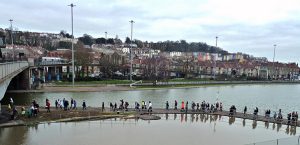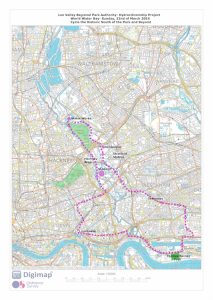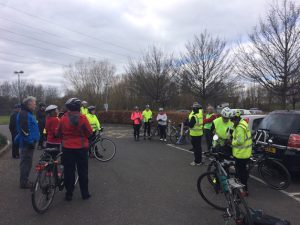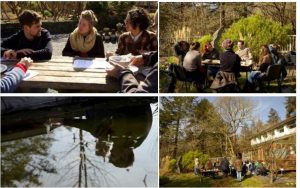52
Tom Payne, University of Aberystwyth; Katherine Jones, University of the West of England, and Owain Jones, Bath Spa University, UK
Sunday March 22nd 2015 was the United Nation’s World Water Day. To mark this initiative the four Hydrocitizenship case study teams (Lee Valley, Bristol, Yorkshire and mid Wales) each staged, or participated in, water themed events. The following blog extracts contain short reflections upon the day’s activities. Full versions can be found on hydrocitizens.com, an online community set up by Tom Payne (and developed by the project team) to enable cross case study collaboration and wider online engagement with creative water-related research.
“In 1993, the United Nations General Assembly designated 22 March as the first World Water Day. 22 years later, World Water Day is celebrated around the world shining the spotlight on a different issue every year. This issue is also the theme of the annual UN World Water Development Report which is launched on World Water Day. In 2015, the theme for World Water Day is ‘Water and Sustainable Development’. It’s about how water links to all areas we need to consider to create the future we want.” (UNwater.org)
Organised by UN-Water, and supported by major international NGOs such as Water Aid, events and social media initiatives occur around the world on World Water Day. The focus is often on key issues of basic water rights, access to safe and sufficient water, water and disease and development.
As our Arts and Humanities Research Council, Connected Communities Programme; Communities, Cultures, Environments and Sustainability Large Grant, “Towards hydrocitizenship. Connecting communities with and through responses to interdependent, multiple water issues” is focusing on the topic of water and sustainability (in UK contexts but with some internatioanl links), it was deemed appropriate for the project’s case study areas to hold World Water Day event on Sunday March 22nd 2015. These events reflected local water opportunities and challenges and extracts from the blog reports on the events are offered below.
World Water Day – Bristol Loves Tides
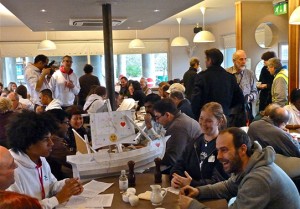 For Water City Bristol the day was an opportunity to collaborate with our partnership project Bristol Loves Tides (BLT). To coordinate with the high tides (time and tide wait for no one!) we started early. By 7:30am over eighty people had assembled at the Lockside Café to enjoy BLTs, speeches and watery conversations.
For Water City Bristol the day was an opportunity to collaborate with our partnership project Bristol Loves Tides (BLT). To coordinate with the high tides (time and tide wait for no one!) we started early. By 7:30am over eighty people had assembled at the Lockside Café to enjoy BLTs, speeches and watery conversations.
At 8:15 we were ushered out to the waterside where we noticed some strangely clad fellows dragging a heavy-looking suitcase. In their barnacle-encrusted coats, Proxi and Perri – the tides made flesh – washed up to where we were gathered. They were greeted by the Lord Mayor of the city but wanted to talk to the ‘future!’. Out of the suitcase, Perri then pulled some intriguing objects, and in pairs the young presenters (part of BLT) went forward to say short pieces on the different themes relating to tides and water.
Next Proxi and Peri invited us all to participate in an oath. Dipping one hand into wonderful gloopy Avon mud and raising it into the air, we repeated our oath to love the water in every way. A film of the oath is on Youtube here
We we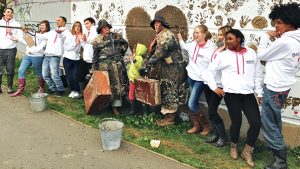 re then led into song, learning this little ditty in three sections:
re then led into song, learning this little ditty in three sections:
We are the tides we ebb and flow
Tuned to the moon we come and go
Ebb and flow and come and go and ebb and flow…
Our last ritual of the morning involved creating a heart shape on the wall with our muddy hand-prints. The wonderful soft sensation of the mud was a great way to connect with the surroundings and the ritual felt both light-hearted and significant.
 Here in Shipley, Yorkshire, the team held a screening of several films reflecting on the local and global relationship we have with water…
Here in Shipley, Yorkshire, the team held a screening of several films reflecting on the local and global relationship we have with water…
The main feature was Watermark (2014). This award-winning documentary film is full of stunningly beautiful images. The film brings together diverse stories from around the globe about our relationship with water: how we are drawn to it, what we learn from it, how we use it. In it we witness how humans are drawn to water, from the U.S. Open of Surfing in Huntington Beach, to the Kumbh Mela in Allahabad, where thirty million people gather for a sacred bath in the Ganges. We see massive floating abalone farms off China’s Fujian coast and the construction site of the biggest arch dam in the world. We visit the barren desert delta where the mighty Colorado River no longer reaches the ocean, and the water-intensive leather tanneries of Dhaka.
As a short “curtain-raiser”, we screened a much more local film, Wading to Shipley (2013). It traces a journey along the hidden reaches of Bradford Beck as it flows towards the town, revealing a surprising landscape…
A local retired civil engineer come film producer also brought his own contribution for screening (untitled, 2015) … made in his own home using his wife’s plants that thankfully he did not kill in the process of trying to film a time-lapse of a plant dehydrating!
World Water Day in the Lee Valley
The Lee V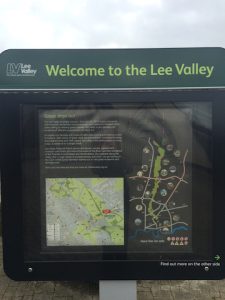 alley Hydrocitizenship team joined the cycle ride event that Lee Valley Regional Park Authority (LVRPA) organised on World Water Day. The circular 25-mile guided cycle ride in the south of the park and beyond started at WaterWorks, with a lunch break at the Thames Barrier Park. 15 cyclists joined the ride from all levels, some of them being members of Edmonton Cycle Club, some who had never cycled in the area before and some very regular cyclists.
alley Hydrocitizenship team joined the cycle ride event that Lee Valley Regional Park Authority (LVRPA) organised on World Water Day. The circular 25-mile guided cycle ride in the south of the park and beyond started at WaterWorks, with a lunch break at the Thames Barrier Park. 15 cyclists joined the ride from all levels, some of them being members of Edmonton Cycle Club, some who had never cycled in the area before and some very regular cyclists.
There are miles of traffic-free cycling routes across Lee Valley Regional Park covering 10,000 acres in London, Essex and Hertfordshire and cycling is one of the most popular ways of transport as well as a leisure activity in the area. Engaging with the cyclists through this event was a great opportunity for the Lee Valley Hydrocitizenship team.
At the start of the ride, I introduced the project to the cyclists and asked them to pay more attention to water during their ride. I later met them at lunch at the Thames Barrier Park and asked them to fill in a short survey about their reflections (a significant part of the cycle route was either by the canal or River Lee) and the importance of water to them as an urban amenity.
Cymerau World Water Day: what happened?
The Cymerau team put on a day-long event at the Centre for Alternative Technology, where we met with artists connected to Borth and Tal-y-bont.
The aim of the event was to provide local artists with an insight into the Hydrocitizenship project and to give them a broad understanding of our proposed year of water-related activity, our Water Map (Sept 2015 – August 2016). We are inviting artists to submit proposals for work that might take place during the year and this event hopefully gave them an idea of some of the things that might be possible.
By the end of the day the gathered artists had generated some really interesting ideas and hopefully made connections with one another that they will follow up later. As a team, we made a lot of discoveries about the different ways that artists work with and approach ‘participation’. I think it would be good to follow up this event with some one to one conversations with the artists involved in order to get a better sense of what they think about this term within the context of their work. It would be interesting to develop a shared local language.
All images are taken by the authors of this blog
Edited by Tom Payne, Katherine Jones and Owain Jones based on original Hydrocitizens.com blog texts by Lyze Dudley, Ozlem Edizel, Katherine Jones and Tom Payne
Author Biographies
Tom Payne is a performer, musician, filmmaker, facilitator, teacher, researcher and freelance digital strategy consultant. He is interested in artistic collaboration, socially engaged arts projects, running workshops, delivering training and providing advice about web strategy development. His practice as research PhD focused on the National Theatre Wales and new and innovative methods of understanding and performing location to produce an alternative theatrical mappings of Wales. He is currently a researcher on the Borth-based case study of the Towards Hydrocitizenship project, for which he developed the hydrocitizens.com online community. Contact email: tsp06@aber.ac.uk
Katherine Jones is a geographer with an interest in human-environment relations, alternative living (ecological communities/eco-villages), governance and the everyday politics of human behaviour and choices. She recently completed a PhD focused on the Lammas eco-village in Wales, and the impact of grassroots political community action on planning policy and practice. She is currently a researcher at the University of the West of England on the Towards Hydrocitizenship project, focusing on human-water relationships in the context of Bristol. Contact email: Katherine12.Jones@uwe.ac.uk
Owain Jones, Professor of Environmental Humanities, School of Humanities and Cultural Industries, University of Bath Spa. Owain specialises in geographies of nature-society relations, place and landscape, community and resilience, the role of memory, nonhuman agencies, and temporalities of landscape. He researches into water and community issues; tidal/coastal landscapes; co-production of knowledge with non-humans; and community, memory, flooding and resilience; in a series of Arts and Humanities Research Council and Economic and Social Research Council funded projects. He has an arts background and frequently collaborates with artists and works in interdisciplinary research teams. He has published a number of peer reviewed papers on the above subjects, and has recently edited the book “Geography and Memory: Identity, Place and Belonging” for the Palgrave Memory Studies Series. Previously he has published the book “Tree Cultures: Places of Trees and Trees in the Place”. Contact email: o.jones@bathspa.ac.uk
